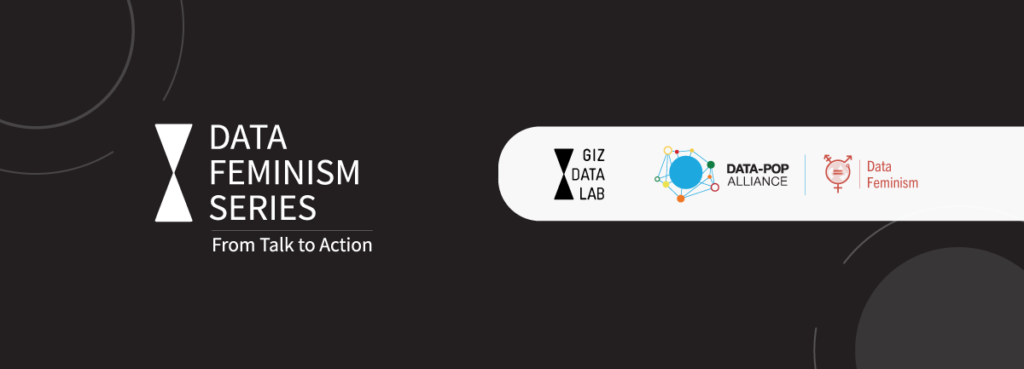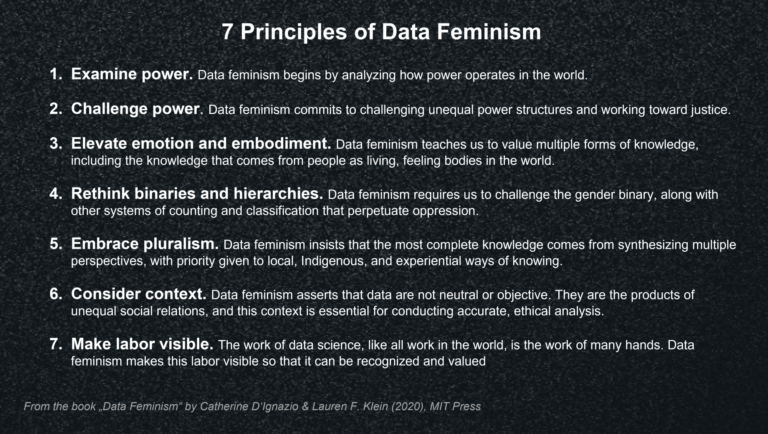
The Data Feminism Series, co-organized and developed by the GIZ Data Lab and Data-Pop Alliance under its Data Feminism Program, aimed at exploring, from different angles, what Feminist Development Cooperation is / should be, specifically within the context of the GIZ. In addition, the series sought to inspire GIZ decision makers to see Gender Data as a cornerstone of a successful Feminist Development Cooperation, which considers power relationships and adopts intersectional approaches. Under the motto “From Talk to Action”, the series was divided into 4 separate events, each featuring high-ranking experts in their field in order to leverage experiences from around the globe, as well as from different sectors and stakeholders. Attendance was a resounding success, with more than 150 people joining the sessions. To learn more about the speakers, the goals and key outcomes from these sessions, read ahead and watch the video recordings.
Session 1: Data as a Cornerstone for a Feminist Development Cooperation
- Date: November 16, 2022 (1 hr.)
- Speakers:
- Dr. Dirk Aßmann, Head of Sectoral Department and GIZ Gender Ambassador
- Dr. Catherine D’Ignazio, the Head of the Data + Feminism Lab of the Massachusetts Institute of Technology (MIT) and widely known author of the groundbreaking book Data Feminism (2020).
- Catherine Vogel, Director, GIZ Data Lab (Moderator)
- Description: The goal of this first session was to set the stage in terms of understanding where GIZ stands today in relation to Feminist Development Cooperation, and the ideas and principles on which this concept is cemented. As such, the first session began with Dr. Aßmann elaborating on the meaning of “Data Feminism” within the GIZ. He emphasized the need to move beyond traditional gender indicators, thereby adopting a more intersectional point of view. Additionally, he mentioned the need to reframe narratives around women (and other marginalized groups) as positive agents of change, rather than passive beneficiaries of support. Following this introduction, Catherine Vogel, Director of the GIZ Data Lab, engaged in an interview with Dr. D’Ignazio, which took place live in New York. During the interview, both explored the concept of Data Feminism and its importance. Again, touching on the need for intersectional perspectives, she outlined the 7 Principles of Data Feminism (pictured below), explaining how these can be integrated into large, well-resourced organizations to increase the agency of beneficiaries and build stronger, more equal relationships with the communities they work with. These principles are discussed in depth in Catherine’s D’Ignazio and Lauren F. Klein seminal book “Data Feminism”.

Session 2: Gender Data Gaps
- Date: December 5, 2022 (1 hr.)
- Speakers:
- Papa Alioune Seck, Chief of Research and Data, UN Women
- Daniela Torres Mendoza, Advisor – Agenda 2030 Mexico Project, GIZ
- Mariana Gonzalez Carrillo, Jr. Advisor – Data4Policy, GP Digital Transformation, GIZ
- Christin Schulz, Jr. Advisor – Prevention of Violence Against Women, PreViMujer Project
- Patricio Aguirre Arauz, LGBTQIA+ Rights Activist, Researcher and Consultant, PreViMujer Project
Description: The second session began with Papa Seck outlining what gender data is (a definition that expands beyond the binary disaggregation of gender) and why it matters for Feminism Development Cooperation, followed by an examination of current global gender data challenges and how they lead to gaps in data. He went on to explain how UN Women addresses these gaps and reiterated to the GIZ audience the importance of integrating gender data into their projects in order to quantifiably improve the lives of women and girls. After this comprehensive overview, members of the GIZ team discussed specific examples of gender data gaps from their own projects in Mexico, which include one addressing unpaid care work performed by women in the country. GIZ consultants from PreViMujer also explored gender data gaps within a project focused on violence against LGBTIQA+ people in Ecuador. These experiences allowed the audience to ground and connect the conceptual framework into the context of GIZ’s work.
Session 3: Beyond the Gaps: Data-Feminist Approaches
- Date: January 17, 2023 (1.5 hours)
- Speakers:
- Anna Spinardi, “Data Feminism” Program Lead, Data-Pop Alliance (DPA)
- Krista Jones Baptista, Executive Director, Data2X
- Bapu Vaitla, Research Fellow, Data2X
- Astha Kapoor, Co-Founder, Aapti Institute
- Shefali Girish, Research Analyst, Aapti Institute
Description: The third session sought to move beyond the gender data gaps to present different approaches that are currently being used to leverage gender data in positive ways, and which Feminist Development Cooperation could benefit from. The session began with DPA’s Anna Spinardi discussing the importance of developing gender data capacity and data literacy skills, and how to integrate them into the data processing cycle. She went on to explain how DPA promotes data literacy in our work through the “4 Building Blocks” of gender data literacy: Context and Concepts, Methods and Tools, Design and Strategy, and Ethics and Engagement (learn more). Speakers from Data2X and the Aapti Institute continued the conversation by exploring the benefits of data cooperatives, both for women and to advance the concepts of Data Feminism as a whole. The use case of Megha Mandli, which is a women’s farming cooperative out of Gujarat, India, was also presented and followed by a discussion of how adding a data layer would prove beneficial.
Session 4: Data Feminism in GIZ - Working Session
- Date: February 1, 2023 (1.5 hours)
- Moderators:
- Vanessa Hochwald, Gender Lead, GIZ Data Lab (Moderator)
- Bya Fernandes, Graduate Research And Teaching Assistant, Cornell University (Moderator and Facilitator)
- Ivette Yañez, Project and Communications Manager, Data-Pop Alliance (Facilitator)
- Natalie Grover, Managing Director, Data-Pop Alliance (Facilitator)
- Sara Ortiz, Project and Communications Manager, Data-Pop Alliance (Facilitator)
-
Description: The fourth session focused on collecting inputs from the previous 3 sessions and channeling it toward creative group work, where participants were able to jointly analyze the five Moonshot Statements prepared by the moderators in order to formulate recommendations for GIZ’s future work related to Data Feminism. To do so, the participants chose what they felt to be the most interesting Moonshot Statement and entered the breakout-group for that topic. After forming these groups, they worked in teams using a pre-designed Concept board (collaborative online tool) to define what the Moonshot Statements meant, the main problems that have prevented GIZ from achieving them, and then formulated solutions (ideas, approaches, resources, stakeholders) to solve these problems. At the end of the session, everyone gathered back together and presented the main points they covered in their breakout-groups. Below, you can find the Moonshot Statements used during the exercise.
Moonshot Statement 1: We foster data ecosystems focused on gender-transformative changes. We use data to give insight for structural changes in gender-specific inequalities, such as filling information gaps or policymaking. Our organization is part of a data ecosystem that is striving effectively to transform existing gender inequalities. Our strong ethical protocols for data cooperation are adapted to our partners, and we only utilize data according to the needs of our partners.
Moonshot Statement 2: We collect data beyond the sex binary and reject oppressive classifications. We think of statistics using a gendered perspective, looking at intersectional inequalities such as race, class, religion, age, sexuality, and caste. We move beyond sex-disaggregated numbers and rethink hierarchies that perpetuate oppression.
Moonshot Statement 3: Communities own their datasets and are the key decision-makers in research.
We are mindful of (potentially harmful) extractive data collection practices and have a community-first approach, being aware of lived realities of all genders. We always discuss and decide alongside communities which is their vision for an ethical and safe way to conduct our projects. Communities decide which data represents them best.
Moonshot Statement 4: We create tools and methods specific for collecting gender data. We make sure to collect high-quality data that allows us to check our impact and monitor the effects of our gender-based strategies. We address and review every gender data gap in the organization and at every stage of our project cycle, adapting if necessary.
Moonshot Statement 5: We prioritize local knowledge regarding gender and analyze data using multiple perspectives.
We respect the ideas of the communities we work with in order to create culturally appropriate strategies. We don't focus solely on the weaknesses or deficiencies of marginalized communities, rather we recognize their strengths and capabilities. We communicate our findings in accessible language and use local terms to express them.
We are certain that the discussions and work carried out during the Data Feminism Series will bring GIZ a step closer to embody the commitments of Data Feminism Cooperation. A special thank you to Catherine Vogel and Vanessa Hochwald at the GIZ Data Lab for bringing us (DPA) along on this journey.


![M002 - Feature Blog Post [WEB]](https://datapopalliance.org/wp-content/uploads/2025/10/M002-Feature-Blog-Post-WEB.png)





